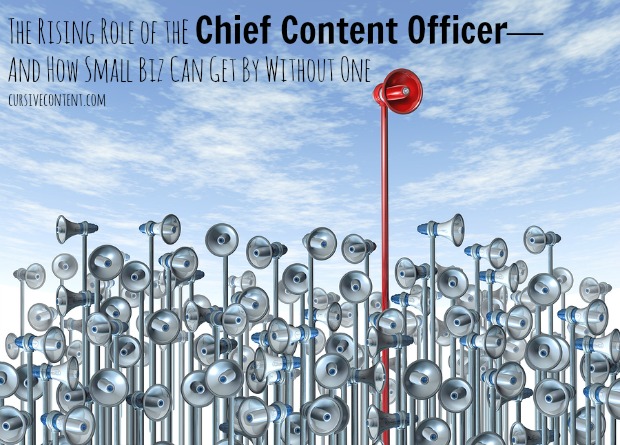The Rising Role of the Chief Content Officer—And How Small Biz Can Get By Without One

Chief Content Officer. It’s a fairly new title that has gained a lot of buzz, because it shows the long-term commitment that many businesses are making to content marketing.
Just look at a few of the companies that have a CCO:
Regardless of the company they work for, a CCO has a lot on their to-do list (for all the nitty gritty details, Content Marketing Institute has a great sample job description). However, their focus is clear, and it’s all about content. Chief Content Officers are devoted to the big picture thinking, and to the details of tactics and implementation. They’re dedicated to growing content marketing efforts and tracking metrics. They provide consistency and oversight. They’re an invaluable part of any company that’s serious about content marketing.
And if you’re a small to medium-sized business, they’re probably completely unattainable.
Often left with no option to hire, let alone for a trailblazing role such as CCO, small businesses find it hard to align their content marketing dreams with their time, budget, and manpower. But even if you can’t hire, you still need to accomplish at least a portion of what a Chief Content Officer would. So what can you do?
Create a content team.
Your organization is filled with unique perspectives. Look beyond the marketing department and select your content team from any part of the company. Look for the smart, savvy, creative, and/or business-minded. Together, this team can generate solid ideas for content topics, uncover a more holistic view of your audiences’ pain points, and put you on the road to solving them.
Keep in mind: The content team still needs a leader, and that should be someone from the marketing department.
Revaluate your time.
Take a look at your to-do list. Are there tasks that can be handed off to someone else? This might not be a popular move, especially in a small workplace, but your boss might be willing to distribute minor parts of your workload on a trial basis.
If this helps you find another few hours a week for content marketing, eventually the entire company will be reaping the rewards.
And while you’re reviewing your to-do list, identify any tasks that are excessively time-consuming or cumbersome. Are there better ways to complete those tasks? For example, inbound marketing software (like HubSpot) can help integrate and consolidate your management and metrics. It’s a lot cheaper than hiring someone and can leave you more time to do the big thinking.
Keep in mind: You should define goals and metrics before you start, so at the end of your trial period you can prove that what you were doing was worth the time and effort.
Build a content network outside the office.
Just because you can’t hire a Chief Content Officer doesn’t mean you can’t work with other people to get the job done. You can:
- Work with freelancers to write, design, edit, proofread—whatever it is you in order to get that landing page, eBook, or video into the hands of your audience.
- Partner with a content marketing agency to strategize and implement your content marketing plan.
- Hire an intern to help with smaller tasks. Since they often get college credit, not money, in exchange for their time, this is a frugal option that can allieviate some stress and allow you to focus.
Keep in mind: You’re still the expert on your business, so even as you unload some tasks, you’ll still need to oversee them.
Although it’s true that none of these things can replace the role of a dedicated Chief Content Officer, they can help you get by while you’re growing your content marketing efforts. Once you’ve proven the impact content marketing can make, you’ll be one step closer to hiring (or becoming) a CCO.
MORE ARTICLES
- 20 Best Productivity Tips for Small Businesses
- Feeling Blah? Get Your Groove Back with These 3 Tips
- Happy Holidays from Cursive Content Marketing
- This Is What Happens When the World’s Fastest Growing Fitness Craze Thinks Outside the Box
- Finding Your Voice: 20 Best Tips for Creating Authority, Authenticity and Individuality in Your Content Marketing
- 20 Best Tips for Setting, Tracking and Measuring Content Marketing Goals
- Content Marketing Summer School for School Communicators: Top Article Roundup
- What Does the Term "Content Marketing" Mean to You?
I love the last point about networking outside of your company to help generate content. I think another point that goes along with that is that often small businesses think that in order to be active on social that they need to create their own content. But just by sharing other people’s content and adding thoughtful commentary can also go a long way in building brand awareness and credibility.
Great point, Tracy!